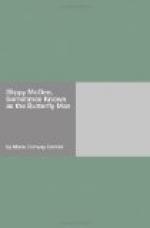One must try to consider the case from Mr. Hunter’s point of view. To refuse Inglesby meant disaster. And who was Laurence, who was Mary Virginia, that he should quixotically wreck his prospects for them? Why should he lose Inglesby’s goodwill or gain Inglesby’s enmity for them or anybody else? Forced to choose, Hunter made the only choice possible to him.
Voe victis!
CHAPTER XVII
“—SAID THE SPIDER TO THE FLY—”
Now I am only an old priest and no businessman, so of course I do not know just how Hunter was set like a hound upon the track of those circumstances that, properly manipulated, helped him toward a solution of his problem—the getting of a girl apparently as unreachable as Mary Virginia Eustis.
To start with, he had two assets, the first being Eustis pride. Shrewdly working upon that, Hunter played with skill and finesse.
When he was ready, it was easy enough to meet Miss Eustis on the street of an afternoon. Although her greeting was disconcertingly cold, he fell into step beside her. And presently, in a low and intimate voice, he began to quote certain phrases that rang in her astonished ears with a sort of hateful familiarity.
A glance at her face made him smile. “I wonder,” he questioned, “if you have changed, dear puritan? You are engaged to Mayne now, I hear. Very clever chap, Mayne. The moving power behind your father, I understand. And engaged to you! You’re so intense and interesting when you’re in love that one is tempted to envy Mayne. Do you write him letters, too?”
Mary Virginia’s level eyes regarded him with haughty surprise. The situation was rather unbelievable.
“Miss Eustis—” he paused to bow and smile to some passing girls who plainly envied Mary Virginia, “Miss Eustis, you must come to my office, say to-morrow afternoon. We must have a heart-to-heart talk. I have something you will find it to your interest to discuss with me.”
She disdained to reply, to ask him to leave her; her attitude did not even suggest that he should explain himself. Seeming to be perfectly content with this attitude, he sauntered along beside her.
“Do you know,” he smiled, “that with you the art of writing genuine love-letters amounts to a gift? I am sure your father—and let’s say Mayne—would be astonished and delighted to read the ones I have. They are unequaled. Human documents, heart-interest, delicate and piquant sex-tang—the very sort of thing the dear public devours. I told you once they meant a great deal to me, remember? They’re going to mean more. Come about four, please.” He lifted his hat, bowed, and was gone.
Mary Virginia went to his office at four o’clock the next afternoon, as he had planned she should. She wanted to know exactly what he meant, and she fancied he meant to make her buy back the letters he claimed not to have destroyed. The bare idea of anybody on earth reading those insane vaporings sickened her.




